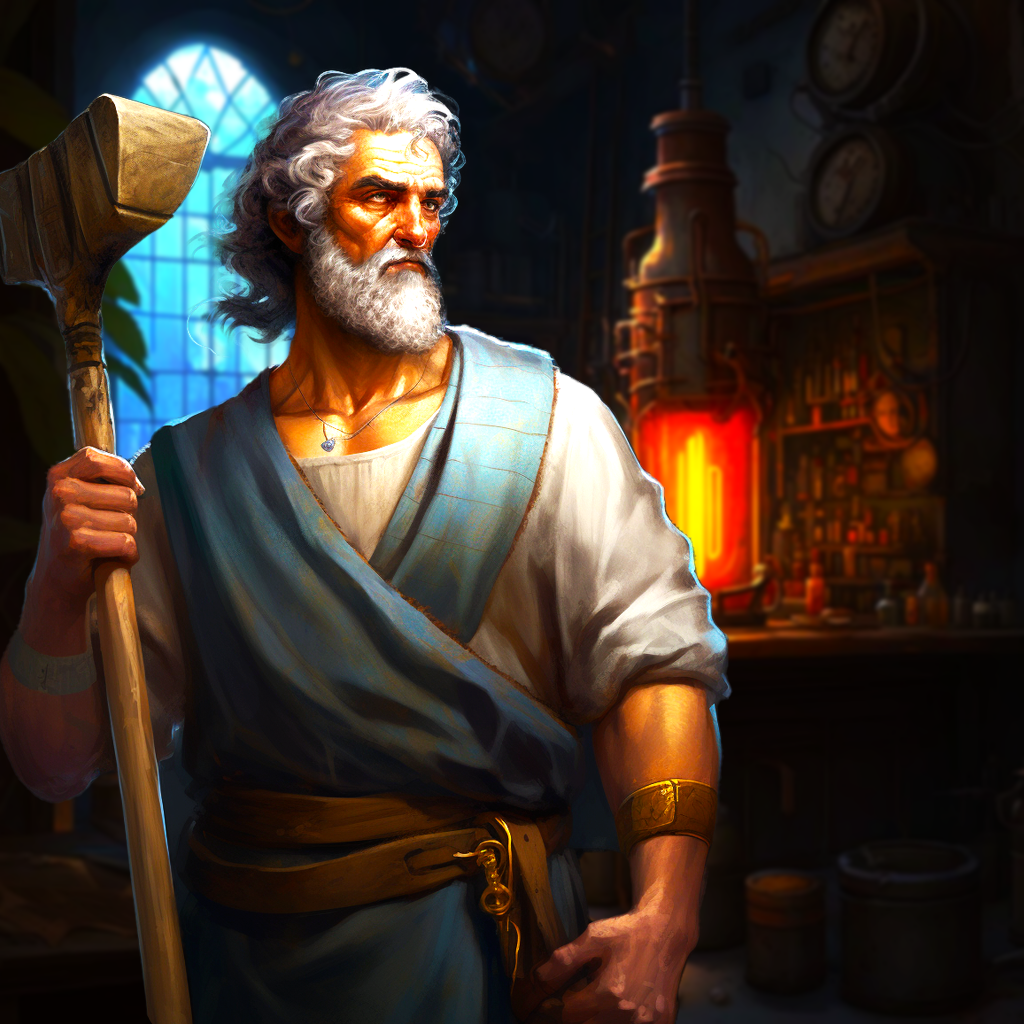The Pantheon: Hephalos
Hephalos:
Alignment: Lawful Neutral
Portfolio: Craftsmanship, technology, invention, skill, precision, dedication
Symbols: An anvil, a hammer, a gear, a measuring compass, a blueprint
Holy days: Artificer's Summit, Gearwright's Festival
Relationship to Chronysia: Sibling of Chronysia, the Goddess of Time and Fate
Relationship with Ceresis: Hephalos collaborates with Ceresis to create tools and technology that improve agriculture and help sustain mortal life.
Relationship with Necralia: Hephalos opposes Necralia's use of undead, as it often perverts the god's technological creations, turning them into instruments of darkness.
Relationship with Phoba-met: Hephalos and Phoba-met occasionally clash, as the latter's fear tactics can hinder progress and innovation.
Invoked: Craftsmen, inventors, and engineers invoke Hephalos for skill and innovation; offerings of crafted items and blueprints are presented.
Depiction: Hephalos is usually shown to be a hardworking and skilled god with a robust build and a rugged appearance. His hair is usually short and peppered with gray, and his eyes are a determined blue. He is dressed in a leather apron and sturdy work clothes, indicative of his dedication to craftsmanship and technology. In one hand, he wields a hammer, ready to shape metal on the anvil that sits beside him. In the other hand, he holds a set of measuring compasses, symbolizing precision and skill. A blueprint unfurled at his feet represents his love for invention and innovation. Gears and other mechanical devices are scattered around his workspace, showcasing his mastery of technology and creation.
If I had a Hammer
In the Age of Assembly, when the lands were slowly converging around Titanus, hundreds of small tribes sought to establish themselves in a world without true civilization. This was a time of great change and uncertainty, as tribes and clans of determined people came together to form the foundations of what would later become thriving cities and nations.
Hephalos cared little for the playing of god the other Marathans seemed to adore, but he took great interest in these budding civilizations. Zamana was free in the world to do as he would, but in the aftermath of one of his carausings, often the creatures would seem to lose all sense of how to rebuild. He sought to guide them, bestowing knowledge and tools to improve their lives and forge connections with neighboring tribes. The people marveled at the inventions and ideas that Hephalos shared, and they began to see the potential of what they could accomplish together. They began to draw together into true civilizations.
Yet, in the shadows lurked Phoba-met. Phoba-met saw the progress that Hephalos inspired, but he was not content to see the mortals band together and grow stronger. He believed that fear was the key to maintaining control over them, and that the uncertainty of the Age of Assembly was the perfect breeding ground for his influence.
And so, Phoba-met began to spread tales of horror among the tribes. He whispered of monstrous beasts lurking in the darkness and of treacherous leaders plotting to betray their people. The tribes and clans, already nervous about the changes taking place, became consumed with fear, and progress ground to a halt. They turned against each other, distrusting their neighbors and abandoning the tools and knowledge that Hephalos had provided.
Hephalos, disheartened by the destruction of his work, confronted Phoba-met on the summit of a great mountain, called Kalgird. There, amidst the howling winds and swirling clouds, the two gods clashed in a battle of wits and wills. Hephalos tried to reason with Phoba-met, explaining that progress and innovation were necessary for the mortals to survive and thrive.
Phoba-met, however, remained unconvinced, arguing that fear was essential to keeping mortals in check, lest they become too powerful and challenge the gods themselves. Their argument raged on, echoing through the heavens and disrupting the course of events on the new world.
Finally, Hephalos proposed a challenge. He asked Phoba-met to choose a tribe, and he would do the same. They would each work their influence on the tribes and see which approach was more successful. Phoba-met, confident in his methods, agreed to the contest.
The two gods went to work, with Hephalos providing his tribe with tools and knowledge, while Phoba-met filled the minds of his tribe with fear and suspicion. As the years passed, it became clear that Hephalos' tribe flourished, building strong bonds with neighboring tribes, developing new technologies, and laying the groundwork for a powerful civilization.
Phoba-met's tribe, on the other hand, stagnated in their fear. They were unable to form alliances or make use of the resources around them, and they eventually faded into obscurity.
In the end, Phoba-met begrudgingly admitted defeat, acknowledging that fear alone could not be the driving force behind mortal life. From that day forward, the two gods would continue to clash, but Hephalos' vision of progress and innovation endured, shaping the world as the Age of Assembly gave way to the rise of great civilizations, and the Age of Zamana.
